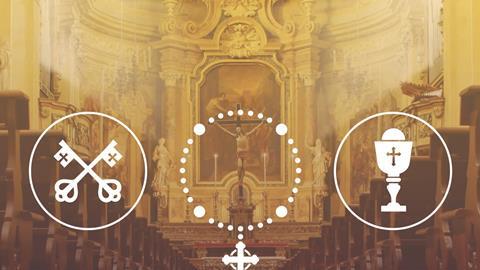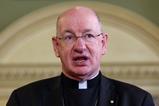Having been saved from atheism to Christianity as a young man, Tony Wilson spent 30 years in the evangelical Church before converting to Catholicism. He describes his extraordinary journey
It’s Holy Saturday 2019. A crowd gathers around a burning fire outside a Roman Catholic church in south-east London. Inside, with the building dimly lit by candles, the whole of salvation history is recounted from the Old Testament.
Upon reaching the gospel story, the church is flooded with light and the bells ring. I’m standing at the front with a white shawl over my shoulder, marking me out as a neophyte about to be confirmed. It’s not where I ever expected to find myself; a journey I never intended to make.
It all started in 1988 when I finished a degree in physics. God used the beauty of mathematics – and a good friend – to nudge me from atheism to evangelical Christianity. Thirty years of deepening my friendship with Jesus followed, along with a love for the Bible, theology and being among God’s people.
Becoming a Roman Catholic was never about turning away from the many good things God did for me through evangelicalism. I’m profoundly grateful for every step of the journey. But my choice to make such a radical move does imply that something needed fixing. And, like all good life events, this one involved mind, body and spirit.
Mind
I had already started exploring Catholicism when my wife and I joined a non-denominational church plant in London. Being part of a network of local churches with vision, great leaders and a strong sense of mission was exciting.
We entered a year-long period of discerning if it was the right place for us to be. Many aspects were right, but the church was more Calvinist than we were used to, and this resulted in a tension in my mind.
I’d always been happy to say that our various Christian denominations had more in common than that which divided us. We pretty much agreed on the key points, I claimed, with only secondary issues in dispute. But this principle started unwinding for me.
Calvinist churches make strong claims about the nature of salvation, for example, which has profound implications. Surely the means by which Jesus saves is not a secondary issue?
Evangelicals teach that the ‘plain meaning’ of scripture is clear to all believers but, if this is true, why do sincere, intelligent and faithful Christians reach very different conclusions?
I started asking whether this was just the way things were, or if Jesus intended to unite us under a single, reliable authority in the Roman Catholic Church. If that latter kind of unity was his intention, then my search for authority should come with a sense of urgency.
It would mean some denominations, including some evangelical ones, were turning away from doctrinal positions held for millennia.
Paul instructed Timothy to pass on everything he had heard him teach to other faithful people (2 Timothy 2:2). Timothy travelled with Paul and would have certainly heard a hundredfold more than he ever wrote down.
And Paul demanded that this oral tradition form part of his legacy to the Church. Timothy had both the written letters of Paul, and his own exposition of them.
What a privilege! If the Church leaders who came immediately after the apostles had the benefit of understanding the Gospels and epistles from hearing the authors preach them, should we not expect to find the most accurate interpretation of the Bible if we look at what they left behind?
Fortunately, there are many writings by early Church leaders, such as Clement of Rome, Ignatius of Antioch, Justin Martyr and Polycarp (who famously learned his faith from John himself). These early Christians were uniform in their interpretation, and profoundly Catholic in their theology, with a deep respect for the Eucharist.
Their ecclesiology looked different from my mental picture of the early Church, as a loose assembly of house churches all gradually developing their own understanding on how to read the scriptures. Instead, bishops looked after regions and guarded a single orthodoxy.
Whenever there was a danger of two divergent theologies developing, councils were called to make authoritative declarations. You were either part of the Universal Church or you were with the heretics. By the latter half of the second Century, the Church extended over the Middle East, Europe and North Africa.
When Irenaeus, the Bishop of Lyons in France, went head-to-head with the Gnostics, he was able to attribute the uniformity of scriptural interpretation to the apostolic succession aligned with the Bishop of Rome. No denominationalism here. I was troubled.
I started to see that Jesus really did mean to delegate special authority to Peter, which was to be exercised corporately with the other apostles and their successors. I had a growing trust that this authority ran through the centuries – which gave me confidence to work through the long list of Catholic doctrines that I found troubling.
One by one, I found they seemed to have a better biblical mandate than many of the things I had previously believed.
Body
For some time, I had suspected that I lived most of my faith in my head. Evangelicals feed the intellect through study, sermons and believing the right things, but something more embodied was calling to me.
After all, Jesus took on flesh to live among us and he worked through the physical world. Some traditions hold an individualistic ‘Jesus and me’ view of salvation but I could now see a stronger call to salvation as a corporate experience of being “found in him” (Philippians 3:9) by being grafted into his mystical body, the Church.
My research reached the point where I plucked up courage to go to Mass. It felt almost illicit but it wasn’t long before I was stunned by the profound experience. Something extraordinary was taking place, and the people taking part were having an intimate encounter with God.
The liturgy was rammed with biblical references and every detail seemed filled with significance.
God didn’t want to only meet us in our minds. He made a physical universe and chose to incarnate himself so that we could experience him bodily. Sacraments are a way of making ordinary, physical stuff into extraordinary signs of God’s presence; none more so than the Eucharist, in which he makes himself as physically present to us as he was to the apostles.
I watched it take place and knew I wanted to share in it. The entire physical universe is endowed with sacramental signs if we care to stop and look.
Reassessing protestant doctrines
I used to believe Sola Scripture, the Reformation principle that the Bible alone provides the means by which we can determine doctrine.
I now believe all of us, according to our chosen tradition, give different weight to books and verses of the Bible, with some turned up loud and others dailed down to a whisper. The doctrines that emerge are as much to do with the verses we select to make our case as the Bible itself – the Bible alone doesn’t tell us which selection to make. In this sense, nobody is a ‘Bible alone’ Christian.
I used to believe experience of the charismatic gifts of the Spirit was limited within Catholicism.
I now believe the Catholic Church has never been cessationist and many of the saints throughout the ages have expressed their faith through gifts of the Spirit. Teresa of Avila considered prayer to be a frequent intimate sharing with Jesus as a friend, and described the delight of praying in tongues. There are many vibrant streams of charismatic renewal in the Catholic Church today in the UK and across the world.
I used to believe Catholicism teaches salvation by works, and is diametrically opposed to the gospel of grace.
I now believe everyone is drawn into saving faith solely by the grace of God. Any good works we carry out are similarly achieved by cooperating with the ongoing grace that God provides. If we receive a crown in heaven, it’s because God is crowning his own work, not ours. (See paragraphs 198 7-2029 of the Catechism of the Catholic Church.)
I used to believe God is more interested in what we believe in our minds than what we do with our bodies.
I now believe the Roman Catholic Church has a profound conviction that the body is as important as our soul, and has much to teach us about our relationship with God. At the start of the sexual revolution in the 1950s, a young Polish bishop, Karol Wojtyła, started work on the theology of the body.
When he became Pope John Paul II, he dedicated his weekly Wednesday preaching to this subject for a full five years between 1979 and 1984. For a popular account of this work see the Introduction to the Theology of the Body by Christopher West (Ascension Press).
Spirit
Looking back, I admit I had been dismissive of any spirituality outside mainstream evangelicalism. Liturgy and set prayers were for people who didn’t really know Jesus personally; a poor second to the spontaneity, authenticity and intimacy of praying informally.
At the same time, I was becoming tired of church meetings where prayer seemed to be as much about seeking approval of the people in the room as petitioning God. My private prayer life relied heavily on ‘arrow prayers’ while I was doing other things, like driving or mowing the lawn; not all bad, but I wasn’t giving the Lord quality time.
The demand for prayer to be authentic became a reason to pray only when I felt inclined.
Worship, on the other hand, engaged my emotions, taking me from 0-60mph in no time, but feelings are fickle and can give the illusion of intimacy. A much deeper part of my soul was being left untouched.
Liturgical prayer is now a big part of my life, both corporately and privately. I don’t need to ‘feel’ inspired to pray and it draws me into scripture I would otherwise avoid. I orientate myself each morning by praying Psalm 95 and the Benedictus (Luke 1:68-79) but, far from becoming routine, I have found them to be a springboard into deeper prayer.
Like a musician riffing off a bass line, liturgical prayer allows the Holy Spirit to snag my attention and bring to mind a person or situation. Ending the day by praying the Examen is a beautiful moment of intimacy with the Lord. (It is encouraging to see these principles being rediscovered across the denominations in, for example, the work of 24-7 Prayer.)
I don’t want to set one spirituality against another; all forms have their risks and rewards. The joyful spontaneity and expressiveness of charismatic worship can give way to overfamiliarity and complacency.
The richness of liturgical prayer can end up as just going through the motions. But whatever form our prayer takes, it must become a deeply ingrained habit that allows the Holy Spirit to form us and draw us into ever-deeper intimacy. God graciously gives us mountaintop experiences, but consistency beats intensity every day.
Ready to jump
After reading dozens of books over three years, my theological objections were answered and my soul was yearning to dive deeper. I reached the point of yielding the decision to God, and prayed: “Lord, if you want to uproot me into the Catholic Church, then surely it’s reasonable for me to ask for a prophetic word.”
I asked God to do this through a specific church pastor who had never previously done anything like that for me.
I told nobody about this prayer but, the next Sunday, the pastor approached me. He said he had a picture from God that he felt sure was for me. It was of a forlorn plant that, after being repotted, had flourished. He said: “I think God wants to repot you!”
I spent ten months in formation with the Catholic parish, both formally and also with delightful lunch meetings with my sponsor, who took the role that a godparent might for a younger person.
Even after reading all 2,865 paragraphs of the Catechism, I still had lots of questions, so our lunch meetings were often heavy on theology. Finally, in the Lent of 2019, I made my first confession, before being brought into communion with the Roman Catholic Church. In the three years since, I have steadily grown closer to God through a deepening friendship with Jesus.
I am thankful for my long-suffering wife and Christian friends who have walked with me on this journey, despite taking a different view. I really do believe in the unity of the Church that Jesus taught and prayed for.
The Roman Catholic Church needs so many of the wonderful characteristics and missionary zeal of evangelical Christianity, and evangelicalism needs the anchor of orthodoxy and the long view of Catholicism.
I appreciate that many Christians are able to incorporate some of the above ideas, such as praying the Examen, into their own traditions and I wish to stand with them as they do so.
But, for me, the Roman Catholic Church has a fullness of expression that I could not resist. I treasure my evangelical roots – and the plant they supported is now flourishing in its new pot.







































No comments yet